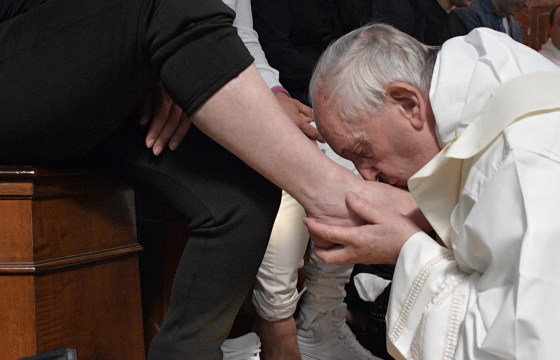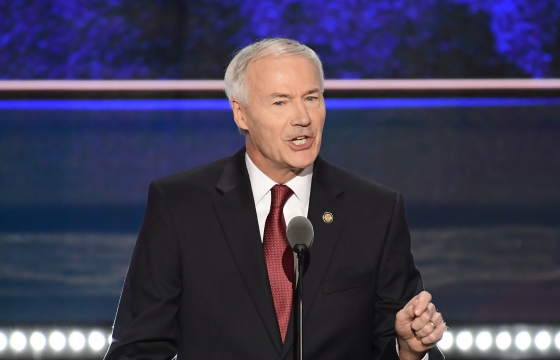A senior US Catholic bishop has pleaded with the Governor of Arkansas to reconsider his plans to execute seven men in the next 11 days to use up the state's last batch of the controversial drug Midazolam because it is due to expire at the end of the month.
Bishop Frank J. Dewane of Venice, Florida, told Arkansas State Governor Asa Hutchinson that he joins Catholics in Arkansas and people of goodwill across the country and the world in urging the governor to reconsider executing these men over the next fortnight.
"May those in Arkansas who hold the lives of these individuals on death row in their hands be moved by God's love, which is stronger than death, and abandon the current plans for execution," wrote Bishop Frank J. Dewane of Venice, Florida, who is chairman of the bishops' Committee on Domestic Justice and Human Development, in an April 13 statement where he urged the sentences of those scheduled to be executed be commuted to life imprisonment.
The executions are scheduled between 17 and 27 April and were announced months ago by Hutchinson, who said they had to be done in quick succession to use the state's final batch of the sedative Midazolam, one of three drugs used in lethal injections, before it expired at the end of April. If carried out, the schedule will bring about the most state-sponsored killings in the US in such a short period of time, since the US Supreme Court revived the death penalty in 1976.
Initially, the state planned to execute eight inmates, but a federal judge at the end of last month placed an emergency stay on one of the executions because the state parole board has recommended clemency. It is unclear if that execution could go forward after the stay is lifted.
Bishop Dewane said the timing for these executions "was not set by the demands of justice, but by the arbitrary politics of punishment," referring to the state's supply of the sedative used in executions. "And so, in a dark irony, a safeguard that was intended to protect people is now being used as a reason to hasten their deaths," he added.
The bishop quoted Pope Francis' 2015 address to the US Congress where he called for a global abolition of the death penalty stating that "a just and necessary punishment must never exclude the dimension of hope and the goal of rehabilitation". He also noted that the US Catholic bishops have echoed this call for many years, particularly in their 2005 statement "A Culture of Life and the Penalty of Death".
He said the church "stands with victims of atrocious crimes and their families," and he said he realised it "can be very difficult to think of mercy at a time when justice for unthinkable crimes seems to cry out for vengeance".
But he also pointed out: "Mercy is the only way to overcome evil. Justice is necessary, very much so, but by itself it is not enough. Justice and mercy must go together."
The use of Midazolam in executions - a sedative which is used to put the victim to sleep while a lethal dose is administered - has been questioned after a number of victims have woken up during their execution. The most documented case of a botched execution is that of Clayton Lockett who woke during his execution and eventually died of a ruptured artery 43 minutes after the Midazolam was administered, in April 2014.
Court documents show how Lockett groaned, writhed, lifted his head and shoulders off the gurney and said the word, "man". Expert medical witnesses believe that the dose of Midazolam failed to complete sedate Lockett, and that it was possible he was awake and in agony during the 43-minute execution but not able to express it because the paralytic drug administered during the execution would have paralysed the muscles in his face.
Authorities at the Oklahoma State Penitentiary drew the blind to the viewing window and had just agreed to stop the execution when Lockwood died.
Speaking to the press in Arkansas this week, Governor Hutchinson spoke of his decision to schedule these executions and his faith as an Evangelical Christian. "Those of faith have different views of their responsibility," he told reporters in Arkansas. "What are the Biblical standards and what are God’s standards on this and how God views this? There’s disagreement among the faith community on this topic. From my standpoint, I have two convictions: One, I think the death penalty is appropriate punishment for the most serious and heinous crimes in our society. Secondly, I have a duty as governor to faithfully execute the laws of our state.
"I’m comfortable with my convictions, but I respect those that disagree with that. But until we reach a different consensus in our country, then I have a responsibility to carry that out."
The executions are scheduled to begin on Easter Monday (17 April). A number of attempts to stay the executions are planned in the lead up to the executions. The first significant attempt has come from two pharmaceutical companies who have filed a "friend of the court" brief in a bid to halt the executions because they do not want their drugs used to kill people.
According to Associated Press, Fresenius Kabi USA and West-Ward Pharmaceuticals Corporation were granted permission to file a friend of the court brief in a lawsuit by the inmates aimed at halting the unprecedented execution schedule. Fresenius Kabi said it appeared that it had manufactured the potassium chloride the state plans to use, while West-Ward had previously been identified by Associated Press as the likely manufacturer of the state's supply of Midazolam.
Both pharmaceutical companies have a policy of not allowing their drugs to be used to kill people, while both have indicated that they have no record of selling the drugs to Arkansas, suggesting the drugs were obtained illegally.
Arkansas has a secrecy law which prevents disclosure of the source of drugs purchased to kill people on death row.




 Loading ...
Loading ...